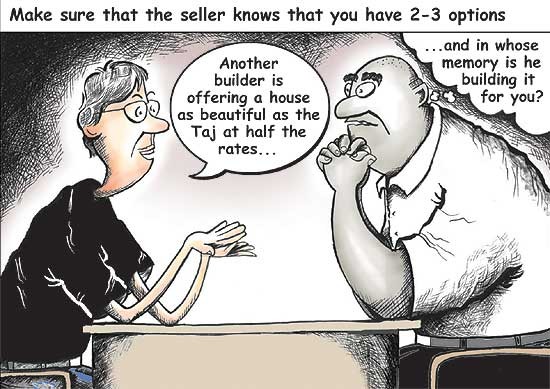The art of negotiation when buying a house
Post on: 19 Июль, 2015 No Comment

Recognizing that being a good negotiator does not come naturally to most people—it must be worked at—is the first step in becoming one.
Due to the upheaval in the Real Estate market in many areas of the country, there are some genuine bargains to be had. Be aware, though, that many of these deals are in the short sale and foreclosure market . and many of those houses are in need of some serious work. You can find more information on buying foreclosures in our article devoted to that subject.
Information
CMA’s—Comparable Market Analyses
Once you have found a home that you are prepared to buy, the first step in your process of negotiation is to determine the fair value for the home. Your Agent can be of great help here, since Real Estate Agents have access to the information that you need: Comparable Market Analyses (CMAs) . A CMA will show exactly what properties similar to the one in which you have an interest have sold for. These analyses are based on fact, rather than opinion, and that information will always be of more value to you. Generally, CMAs will list houses in a particular location that are currently on the market, have sales pending on them, have expired from the market, and have sold. Be forewarned: it is primarily the SOLD properties that you need to be concerned with. What houses are on the market for is not always a good indication of what their value is, those that have pending sales will only tell you what the listing price is (not what it is going to sell for) and those that have expired because they haven’t sold may indicate that they didn’t move because they were overpriced.
The CMA which you obtain will most likely give you some general information about the houses that will be compared: Number of bedrooms and baths, square footage, the listing price and the sold price. It is important that the CMA focuses on houses similar to the one you have selected. If you are interested in a 4 bedroom, 2 1/2 bath 2 story, a CMA that lists only 3 bedroom 1 bath homes is of little or no value. Likewise, a CMA that includes a number of properties from a neighborhood 2 miles away will have limited value. To have a good CMA you must have all of the similar sales in the neighborhood in the last year. Obviously, the fresher the data (the more houses sold in the last few months), the better the CMA.
Note: In all likelihood, if you are dealing with the Selling Agent instead of a Buyer’s Agent . you will not have access to a CMA. This is one of the many reasons that it is vitally important to consider Buyer’s Representation. If you have not read the section on Agency . it is a good idea to do it now.
Condition
Once you have the information in hand, it is important to drive by all of the properties that are listed in the SOLD column. Why? Because condition has so much to do with the ultimate selling price of a house. Does the home in which you are interested shine above or fall below the others that have sold. Size, number of rooms, and lot size can only tell you so much. Your eyes will be able to tell you a lot more. Make a realistic comparison between the condition of your chosen house and those that have recently sold. Then adjust your thinking up or down from what you have seen.
Extra Amenities
Does the house you have chosen have more or less amenities than the comparable homes? Although amenities will not affect the value as much as location or condition will, they still can be a factor. Be wary, though. An outdoor hot tub may have been a major motivating factor in your choice of a house, but it will not add a great deal to the value of the property.
Motivation
An effective negotiator will gather as much information as is available on the house and the sellers. Obviously, one of the most important pieces of information you can have is the seller’s reason for selling. Is it a case of having to sell or wanting to sell? Or, is it a case of lets throw it on the market at a goofy price, and if somebody bites, we’ll move? If your Agent represents you in the transaction as a Buyer’s Agent, they may or may not be able to secure this information for you (it depends on what the seller and the Seller’s Agent want to reveal). If you are working with an Agent that represents the seller in the transaction (or in a Dual Agency position) they cannot disclose this information without the seller’s consent. (For more information, see the page on Agency . ) Even if this information cannot be revealed to you, a friendly discussion with one of the neighbors may give you a feel for the situation.
Preparation
Just having the right information is not enough. You must prepare yourself in order to use it effectively. The most important factor in your preparation is your emotional frame of mind. Buying a house is emotionally charged enough, without adding more fuel to the fire by letting your emotions override your common sense. It is not unusual to be excited—in fact, it is normal—but you must keep your excitement in check or you will lose the value of all the information you have gathered.
In addition to your emotional frame of mind, your financial frame of mind should be in order. An offer to purchase will carry a lot more weight if there are no dangling financial problems and if you have been pre-qualified for a mortgage .
You can’t be afraid to let it go. You must convince yourself that if the price is not to your liking (or worse, above your budget), you will be able to walk away. It is important for you to set a realistic limit and then stick to it. Overpaying for a house is epidemic among buyers who let their emotions rule their better judgment. It becomes very easy to regret paying too much for a house when you make a mortgage payment every month. Unlike a product that you overpay for once when you buy it, a house reminds you every 30 days that you made a mistake!
Finally, plan your work and work your plan. Organize your information and have it quickly available. When it comes time to make an offer, you don’t want your ammunition scattered on scraps of paper in the back seat of your car. Again, familiarize yourself with offers and contracts . since this is how you will be negotiating.
Realism
Don’t throw away all of the information gathering and preparation you have done by making a ridiculous offer on a well priced home. Nothing will turn a seller off more than a low ball offer on a house that has been realistically priced. Often, negotiations will stop, rarely to be revived again. If they are re-opened, the sellers generally will show their displeasure at the initial low offer by locking at or near the listing price.
An example: Mr. and Mrs. Buyer have been looking at houses for months. Finally, they find the perfect house, which is an ideal match for their needs and wants. The house is listed at $155,000. Mr. and Mrs. Buyer have a CMA in hand that shows average selling prices in the neighborhood to be in the $148,000 to $153,000 range. Ignoring the information they have, they make an offer of $120,000. Mr. and Mrs. Seller, annoyed at the low offer, counter offer at full selling price, $155,000. The Buyers, still convinced that they can steal this house, make a 2nd offer of $125,000. The Sellers, now very frustrated, do not move from their $155,000 price. Suddenly, there is word that another offer is forthcoming, this time from Mr. and Mrs. Smith. In fear of losing the house, Mr. and Mrs. Buyer up their offer to $154,000 (still needing some concession) and the Sellers accept. Consider, though, that a realistic first offer in the $150,000 range (remember, the CMA showed $148,000 to $153,000) may well have been accepted by the Sellers. If this were the case, the Buyer’s paid $4000 more than they had to.

The moral: An unrealistic offer on a house that meets your needs and is priced correctly could end up costing more than it would with a realistic offer.
Educating Yourself
If you are looking for a clear analysis of the negotiation process, a new book by Deepak Malhotra and Max H. Bazerman, Negotiation Genius. may be just what you need. Whether you’ve “seen it all” or are just starting out, Negotiation Genius will dramatically improve your negotiating skills and confidence. Drawing on decades of behavioral research plus the experience of thousands of business clients, the authors take the mystery out of preparing for and executing negotiations—whether they involve multimillion-dollar deals or improving your next salary offer.
What sets negotiation geniuses apart? They are the men and women who know how to:
•Identify negotiation opportunities where others see no room for discussion
•Discover the truth even when the other side wants to conceal it
•Negotiate successfully from a position of weakness
•Defuse threats, ultimatums, lies, and other hardball tactics
•Recognize when the best move is to walk away
•And much, much more
It gives you detailed strategies—including talking points—that work in the real world even when the other side is hostile, unethical, or more powerful. When you finish it, you will already have an action plan for your next negotiation. You will know what to do and why. You will also begin building your own reputation as a negotiation genius. See more about Negotiation Genius at Amazon.com.














